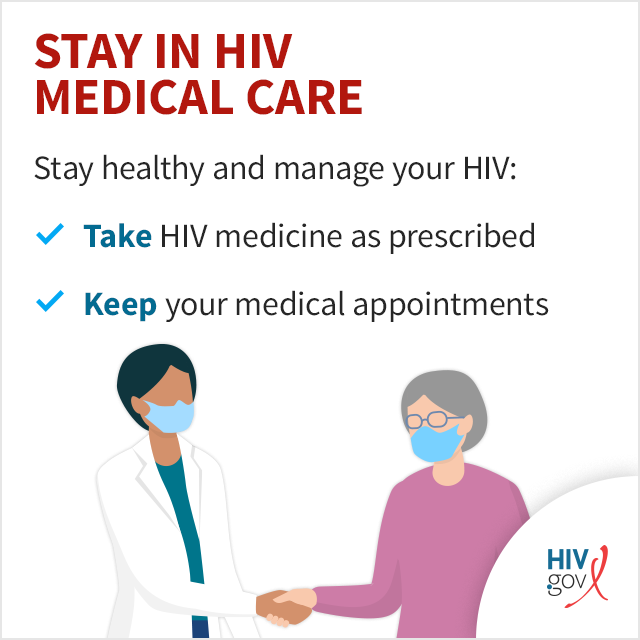Making Care Work for You

What Are the Benefits of Staying in HIV Medical Care?
HIV treatment is a lifelong commitment to your health and well-being. People who are newly diagnosed with HIV sometimes find it overwhelming. But HIV is a manageable disease and people with HIV are living longer now compared to when HIV was first discovered. People with HIV who take HIV medicine (called antiretroviral therapy or ART) exactly as prescribed and get and keep an undetectable viral load can stay healthy and will not transmit HIV to an HIV-negative partner through sex. An undetectable viral load is a level of HIV in your blood so low that a standard lab test can’t detect it. Most people can get the virus under control within 6 months of starting treatment.
See Your HIV Health Care Provider Regularly
Part of keeping the virus in check and staying healthy is seeing your HIV health care provider regularly—usually a couple of times a year, depending on your health.
At your HIV medical care appointments, your provider will run blood tests to monitor your HIV infection and make sure your HIV medication is working properly. Your provider will also treat you for other health concerns you may have and help connect you to resources to help you with other issues that could affect your ability to stick to your HIV treatment plan.
If you don’t have a provider or want to find a new one, get tips on how to locate an HIV health care provider.
How Can You Make the Most of Your Medical Care?
HIV care and treatment is most successful when you actively take part. That means taking your HIV medications as prescribed, keeping your medical appointments, communicating honestly with your health care provider, and seeking more information from accurate and reliable sources. However, health care providers know that taking HIV medication as prescribed and seeing a HIV health care provider regularly can be difficult for some people. For example, some people may experience side effects from medication. Others may have trouble taking their medication on time given a busy work schedule. If you’re having trouble taking your HIV medicine and staying in medical care, talk to your provider right away. Together you can identify the reasons and make a plan to address them.
You can find the support and assistance you need. For example, you might find it useful to join a support group with other people with HIV. Or your HIV care team might be able to connect you to a peer navigator who has been down this road and can share lessons and perspectives that might be helpful. Many HIV care teams also offer case management services to help connect you to other supportive services that can help you overcome obstacles to continuing your regular HIV medical care.
Taking the steps that are necessary for you to get control over the virus will make it easier for you to put more time and energy toward the other parts of your life. Once you find a strategy that works for you, HIV can become a routine part of your life. If unexpected things happen that make it harder to manage life with HIV again, step back and think about what has changed. Don’t be too hard on yourself and give up. Get support from your health care provider, your behavioral health counselor, if you have one, and others. Think about some of the obstacles that you have already overcome and remind yourself of your strengths and abilities.
You can make HIV care work for you. Your HIV care team can help. Some of the other information on this site may be useful to you in figuring this out, especially the information about HIV treatment, mental health, substance use and other topics related to living well with HIV.